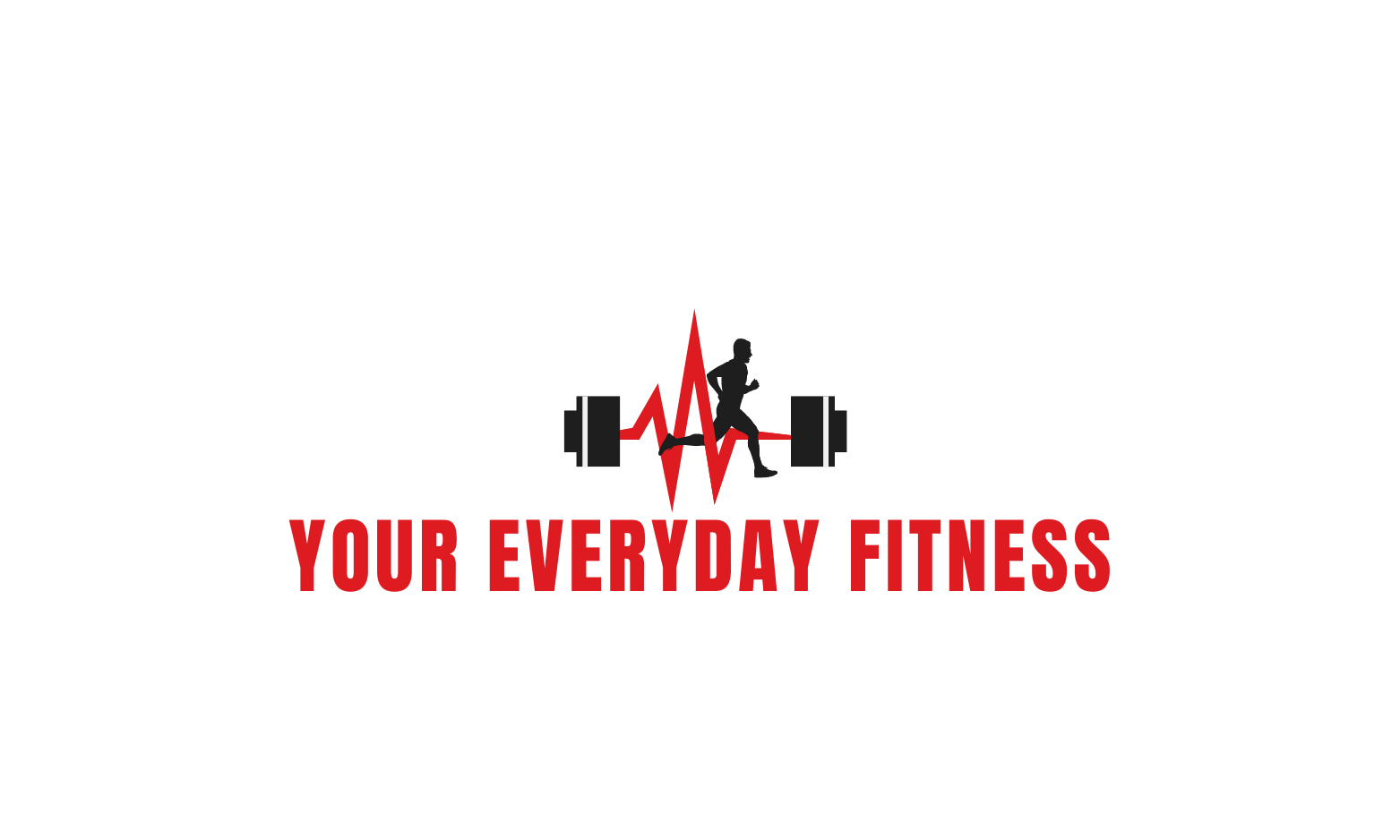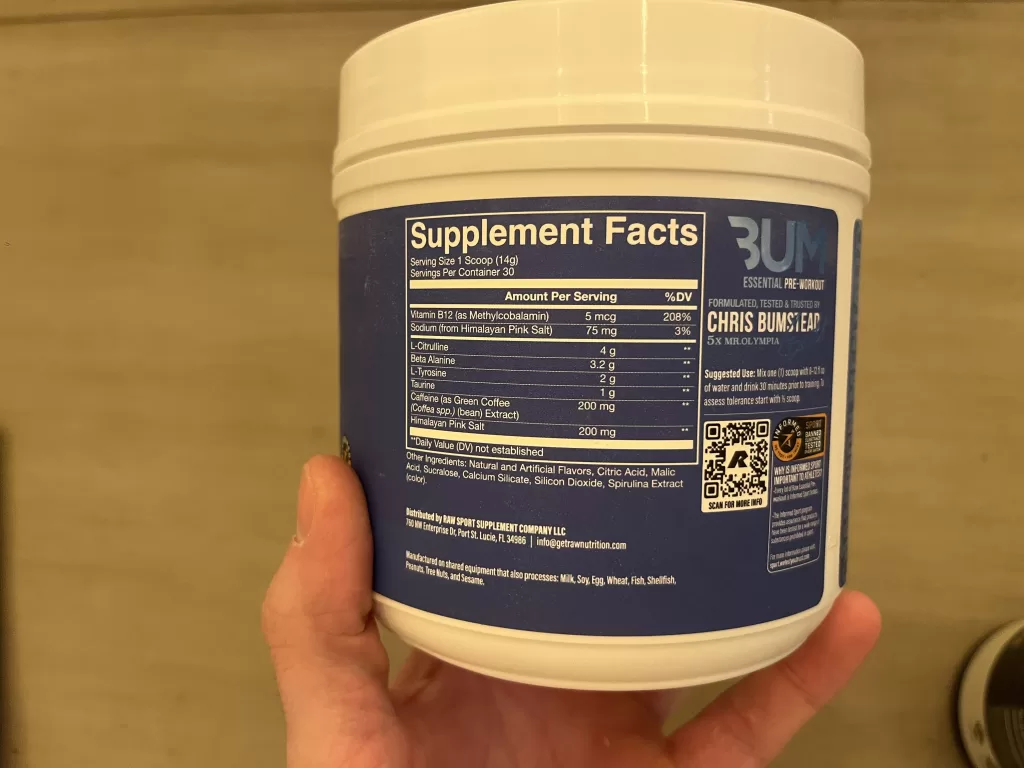Pre-workout supplements are extremely popular in the fitness community, and for good reason; it is a powerhouse supplement that can massively improve performance. If you are looking to buy some pre-workout, and you are wondering what to look for in pre workout, you aren’t alone.
There are so many different kinds of pre-workout supplements in 2025, which can be very confusing, and a bit overwhelming.
Some products promise to increase energy and performance, while others focus on recovery and muscle growth. So, how do you choose?
This guide breaks down the key pre-workout ingredients, their benefits, and what to avoid. All recommendations here are based on scientific evidence, with all of our sources referenced, so there is no need to just take our word for it.
Anyways, let’s get into what you should look for in pre workout supplements if you are into strength training, high-intensity exercise, or endurance workouts.
What Is a Pre-Workout?
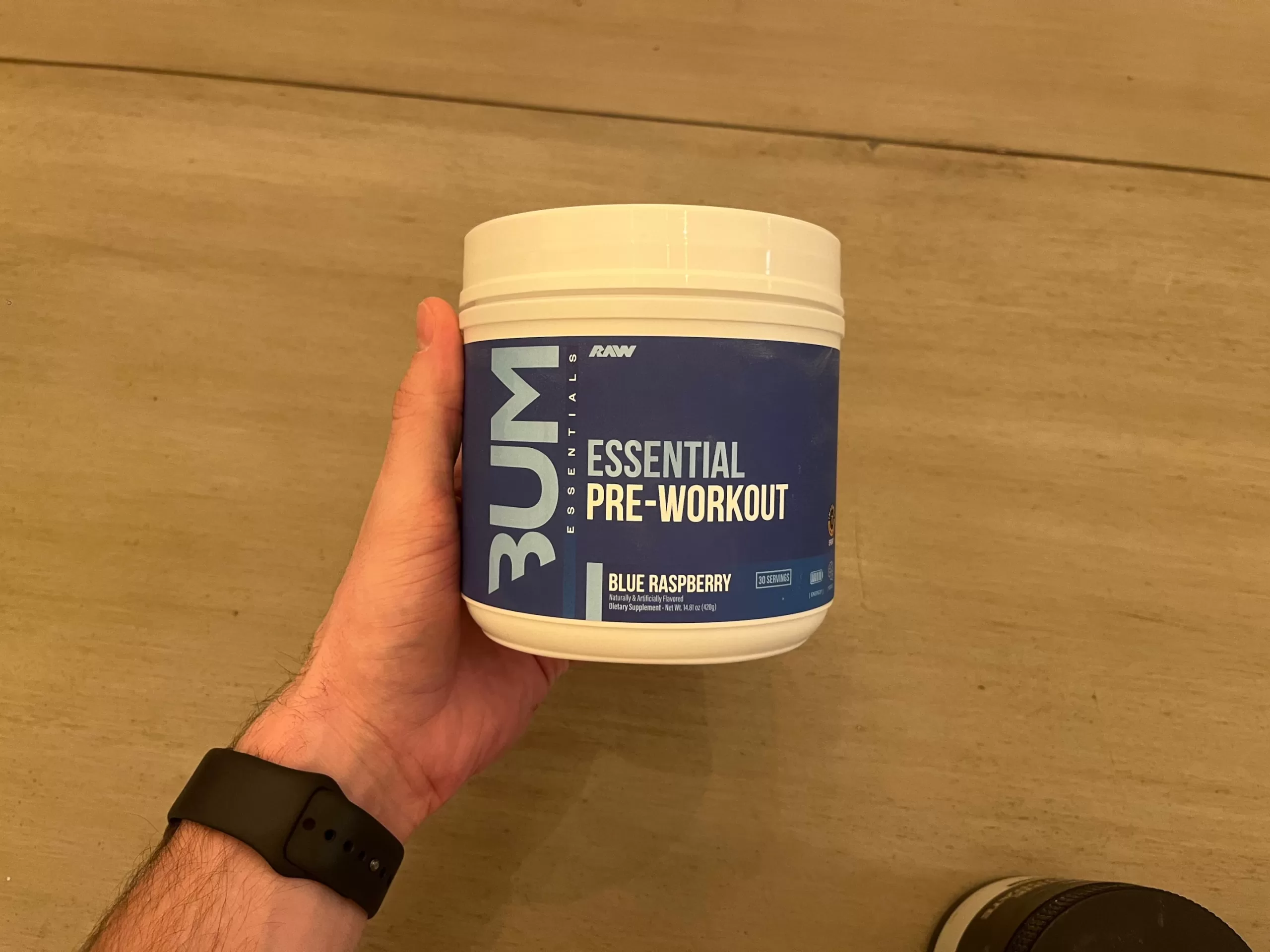
Pre-workout is a supplement designed to boost your performance during exercise.
Most pre-workout supplements are a powder that you mix with water, but you can also buy them as drinks or capsules.
How It Works
Pre-workouts are formulated with many different active ingredients that support energy production, muscle building, and recovery.
They stimulate the central nervous system, which improves blood flow to your muscles, and delays muscle fatigue.
Related: How Long Does Pre-Workout Take to Kick In?
Types of Pre-Workouts
- Stimulant-based: These are the most common, and likely what you’re looking for. These pre workouts contain caffeine and other stimulants to give you a boost of energy and focus.
- Non-stimulant: These pre workouts don’t have stimulants, but are great for blood flow, endurance, and recovery.
- Vegan pre-workouts: Vegan pre workouts are made from plant-based ingredients and avoid animal-derived products.
Why Ingredients Matter in Pre-Workouts
The effectiveness of a pre-workout depends entirely on its ingredients and their dosages.
A good pre-workout supplement includes scientifically proven ingredients, avoids artificial flavors and sweeteners, and lists everything clearly on the nutrition label.
Best Ingredients to Look For in a Pre-Workout
Caffeine
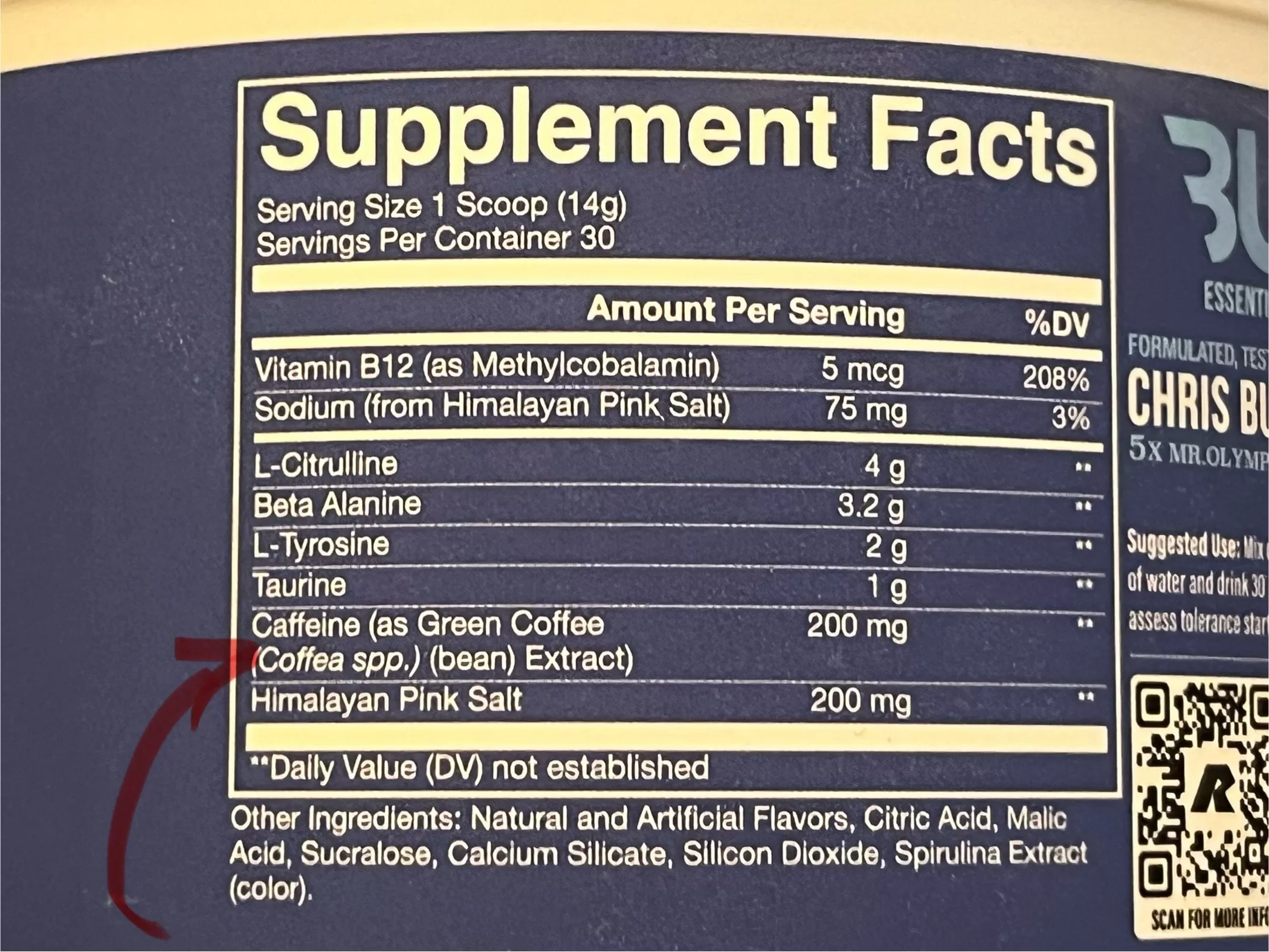
For many people, caffeine is a must-have ingredient in their pre-workout supplement, and it is a huge favorite among athletes. Personally, I love the boost caffeine gives me before a workout.
Why Use Caffeine in Pre-Workout?
- Boosts Power and Performance: Studies show caffeine significantly improves anaerobic power, increasing peak power by nearly 60 watts after supplementation (Martinez et al., 2016). This is ideal for high-intensity activities like sprinting or lifting.
- Enhances Endurance: Caffeine delays fatigue, preserves glycogen, and boosts fat oxidation, helping you push harder for longer (Goldstein et al., 2010).
- Improves Focus: Caffeine sharpens mental clarity and reaction times, especially under fatigue, making it great for both cognitive and physical demands.
How Much and When to Take?
- Dosage: Aim for 1.4–2.7 mg per pound of body weight. That being said, it is recommended that you do not take more than 400mg of caffeine per day. You can also go less than this amount. I am 190 pounds, and take around 150-300 mg of caffeine.
- Timing: Take caffeine 30–60 minutes before exercise for optimal effects.
Things to Watch Out For
Caffeine can be dangerous if abused, so watch out for these signs.
- Overconsumption: Stick to recommended doses to avoid jitters or an elevated heart rate.
- Sleep Impact: Avoid caffeine within 6 hours of bedtime to prevent sleep disruption.
- Sensitivity: Start with lower doses if you’re new to caffeine or experience anxiety.
L-Theanine
Adding L-Theanine to your pre-workout can boost focus, balance energy, and enhance cognitive performance, especially when paired with caffeine. Let’s go over the benefits.
- Enhances Focus and Clarity
L-Theanine improves cognitive function, particularly in attention-demanding tasks, and reduces distractions during workouts (Owen et al., 2008). - Balances Energy and Reduces Jitters
Paired with caffeine, L-Theanine delivers smooth energy without the overstimulation or crashes often caused by caffeine alone (Owen et al., 2008). - Improves Mental Performance Under Pressure
Research on athletes shows that theanine reduces stress and supports better decision-making during high-pressure activities (Yilmaz et al., 2023).
Dosage: Look for a 2:1 ratio of L-Theanine to Caffeine (e.g., 200 mg of theanine with 100 mg of caffeine).
Beta-Alanine
Beta-alanine helps delay muscle fatigue by buffering lactic acid in your muscles. This is why many pre-workout supplements include it. Let’s go over the benefits.
- Delays Fatigue: Beta-alanine buffers lactic acid by increasing muscle carnosine levels, reducing acidosis during high-intensity exercise.
- Ideal for Short Bursts: Best for activities lasting 1–4 minutes, like sprints or interval training (Trexler et al., 2015; Hobson et al., 2012)..
- Boosts Performance: Daily doses of 4–6 grams for 4 weeks improve endurance and time-to-exhaustion by up to 2.85% (Trexler et al., 2015).
- Supports All Athletes: Effective for strength, endurance, and older individuals by reducing neuromuscular fatigue.
- Safe to Use: Tingling may occur but can be managed with smaller or sustained-release doses.
Creatine Monohydrate
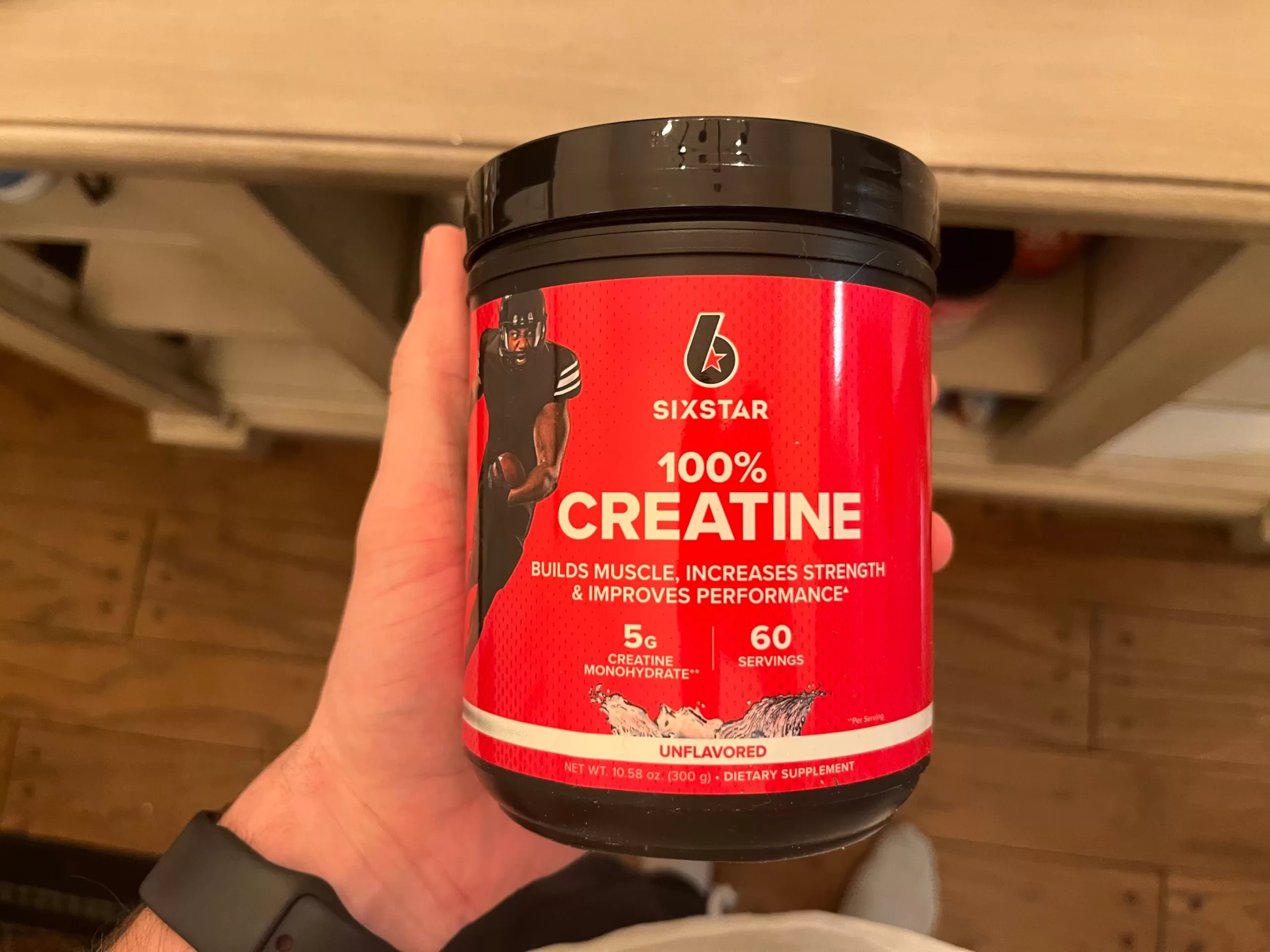
Creatine is one of the most popular supplements in the fitness industry, and it is supported by plenty of scientific research. It can be a powerful ingredient in pre-workout supplements because it enhances strength & power, supports muscle protein synthesis, preserves lean muscle mass, and enhances performance during short, high-intensity activities.
support muscle protein synthesis, and preserve lean muscle mass.
By increasing phosphocreatine stores in muscles, creatine improves ATP production, providing the energy needed for heavy lifts, sprints, or other demanding exercises.
Research consistently shows that creatine supports muscle recovery, boosts lean mass, and increases training volume over time (Trexler & Smith-Ryan, 2015; Antonio et al., 2021).
Citrulline Malate
Citrulline malate (CM) is a key pre-workout ingredient that boosts exercise performance and recovery by enhancing nitric oxide (NO) production, increasing blood flow, and reducing fatigue. Here are all of the key benefits of this ingredient:
- Enhances Performance: Boosts nitric oxide (NO) production, improving blood flow and muscular endurance (Perez-Guisado et al., 2010).
- Increases Reps: An 8-gram dose enhances repetitions to failure in exercises like bench and leg press (Perez-Guisado et al., 2010; Wax et al., 2015).
- Reduces Soreness: Cuts muscle soreness by up to 40% within 24–48 hours post-exercise, aiding recovery (Perez-Guisado et al., 2010).
- Delays Fatigue: Supports ammonia clearance and buffers lactate during high-intensity efforts (Perez-Guisado et al., 2010).
- Optimal Use: Choose a 2:1 citrulline-to-malate ratio and take 8 grams 1 hour before exercise (Perez-Guisado et al., 2010; Wax et al., 2015).
Betaine Anhydrous
Betaine, a compound found in foods like spinach and beets, offers several benefits when included in pre-workout supplements, especially for individuals engaged in resistance training.
- Boosts Body Composition: A 6-week study with 2.5 g/day of betaine reduced body fat by 3.2%, increased lean body mass by 2.4 kg, and enhanced arm muscle size by 4.6 cm² (Cholewa et al., 2013).
- Improves Training Volume: Betaine supplementation increased bench press work capacity, supporting greater workout volume for muscle growth and endurance (Cholewa et al., 2013).
- Supports Metabolism: Regulates homocysteine thiolactone (HCTL), linked to insulin resistance and protein synthesis inhibition, enhancing metabolic and anabolic responses (Cholewa et al., 2013).
- Potential for Power Gains: While strength gains were not significantly different, there was a trend toward improved power output, making it beneficial for high-intensity training (Cholewa et al., 2013).
Branched-Chain Amino Acids (BCAAs)
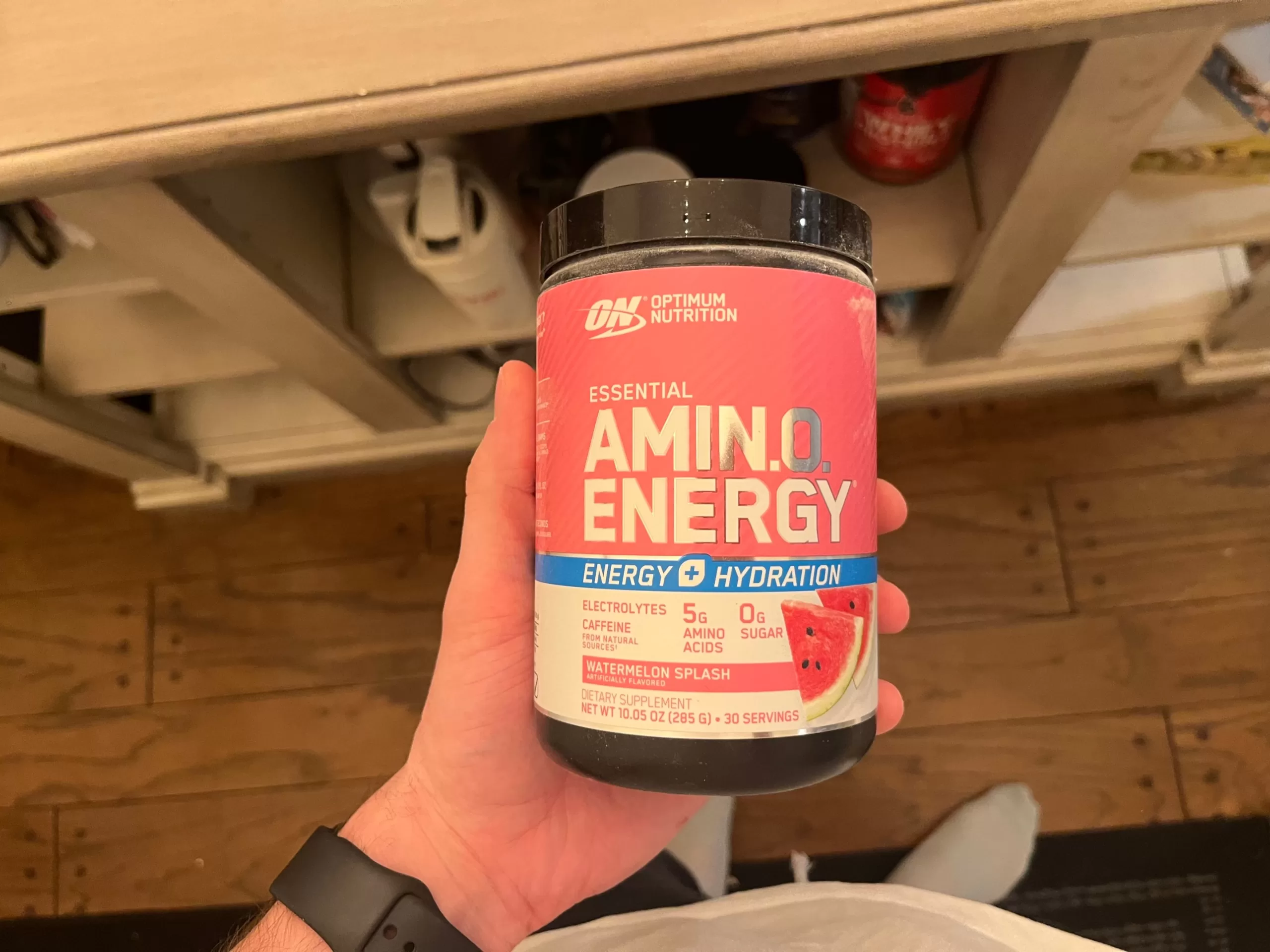
BCAAs are a group of three essential amino acids—leucine, isoleucine, and valine, all play a critical role in muscle recovery and performance. Research highlights that BCAAs can reduce exercise-induced muscle soreness and support recovery by decreasing muscle damage markers like creatine kinase (Martinho et al., 2022).
BCAAs may delay fatigue during prolonged exercise by increasing the BCAA-to-tryptophan ratio, which reduces serotonin production linked to fatigue (Blomstrand et al., 2006).
The recovery benefits make them a valuable addition to pre-workout supplements for those doing strength or endurance training. The recommended dosage is 200 mg/kg/day over multiple days to optimize recovery effects (Martinho et al., 2022).
Tyrosine
Research highlights Tyosine’s role in improving focus, cognitive performance, and stress resilience during intense exercise (Sutton et al. (2005)).
This ingredient is a precursor to neurotransmitters like dopamine and norepinephrine, may help maintain mental alertness and reduce fatigue under high-stress conditions, such as prolonged or high-intensity workouts.
This can be very beneficial for athletes facing cognitive demands alongside the physical exertion.
Suggested Dosage:
- 150 mg/kg body weight, ingested 30-60 minutes before exercise, is commonly studied and considered effective for cognitive support under stress. For practicality, a dose of 500-2000 mg is often included in pre-workouts.
Alpha-GPC
Alpha glycerylphosphorylcholine (A-GPC) enhances strength and power by increasing acetylcholine, a key neurotransmitter for muscle contractions.
Research by Bellar et al shows 600 mg daily can boost lower body strength by over 3% within six days, making it ideal for power and speed athletes.
Additionally, A-GPC may support growth hormone release, boosting performance and recovery. A-GPC is a solid addition for athletes seeking strength and performance gains.
Electrolytes
Electrolytes like sodium, potassium, and magnesium are crucial for hydration, muscle function, and performance. Vigorous exercise, especially in heat, can lead to substantial fluid and electrolyte losses—up to 10 liters of water and 7,000 mg of sodium daily—causing dehydration, increased cardiovascular strain, and reduced endurance.
Pre-workout electrolytes help maintain hydration, optimize muscle contractions, and support rapid recovery when needed (Shirreffs & Sawka, 2011).
Electrolytes were necessary for me during all of my marathon training, and it is no coincidence it is top of the list for endurance athletes.
Taurine
Taurine is a valuable addition to recovery regimens, helping athletes bounce back faster and maintain performance.
- Supports Muscle Recovery: Taurine supplementation at 0.1 g/kg body weight/day accelerates recovery from eccentric exercise-induced muscle damage by reducing oxidative stress and inflammation (McLeay et al., 2017).
- Restores Performance Quickly: In a study, taurine significantly improved eccentric peak torque recovery within 48 hours post-exercise compared to a placebo (McLeay et al., 2017).
- Ideal for High-Intensity Training: Effective for athletes involved in intense or eccentric-based activities, aiding faster recovery and improved performance (McLeay et al., 2017).
B Vitamins
Vitamin B complex (B1, B2, B6, B12) is a great tool for energy production and metabolism, acting as cofactors in converting carbs, fats, and proteins into usable energy. For example:
- B1 and B2 support ATP production through the citric acid cycle and fatty acid oxidation.
- B6 aids glycogen breakdown for glucose.
- B12 enhances fatty acid and amino acid metabolism.
A 28-day study found vitamin B complex improved endurance by 26% and reduced fatigue markers like blood lactate and ammonia, showing its role in sustained energy and performance (Lee et al., 2023)
Nitric Oxide Boosters
Nitric oxide (NO) boosters like L-citrulline, L-arginine, and nitrates improve cardiovascular health by enhancing blood flow, relaxing blood vessels, and reducing vascular resistance. Key findings include:
- Blood Vessel Relaxation: NO promotes vasodilation by activating cGMP, improving nutrient and oxygen delivery.
- Enhanced Blood Flow: L-citrulline (≥3 g/day) and nitrates (≥400 mg/day from beetroot juice) effectively increase plasma NO, benefiting cardiovascular function.
- Practical Use: Combining L-citrulline and nitrates may amplify effects, supporting vascular health and exercise performance.
Ingredients to Avoid in Pre-Workouts
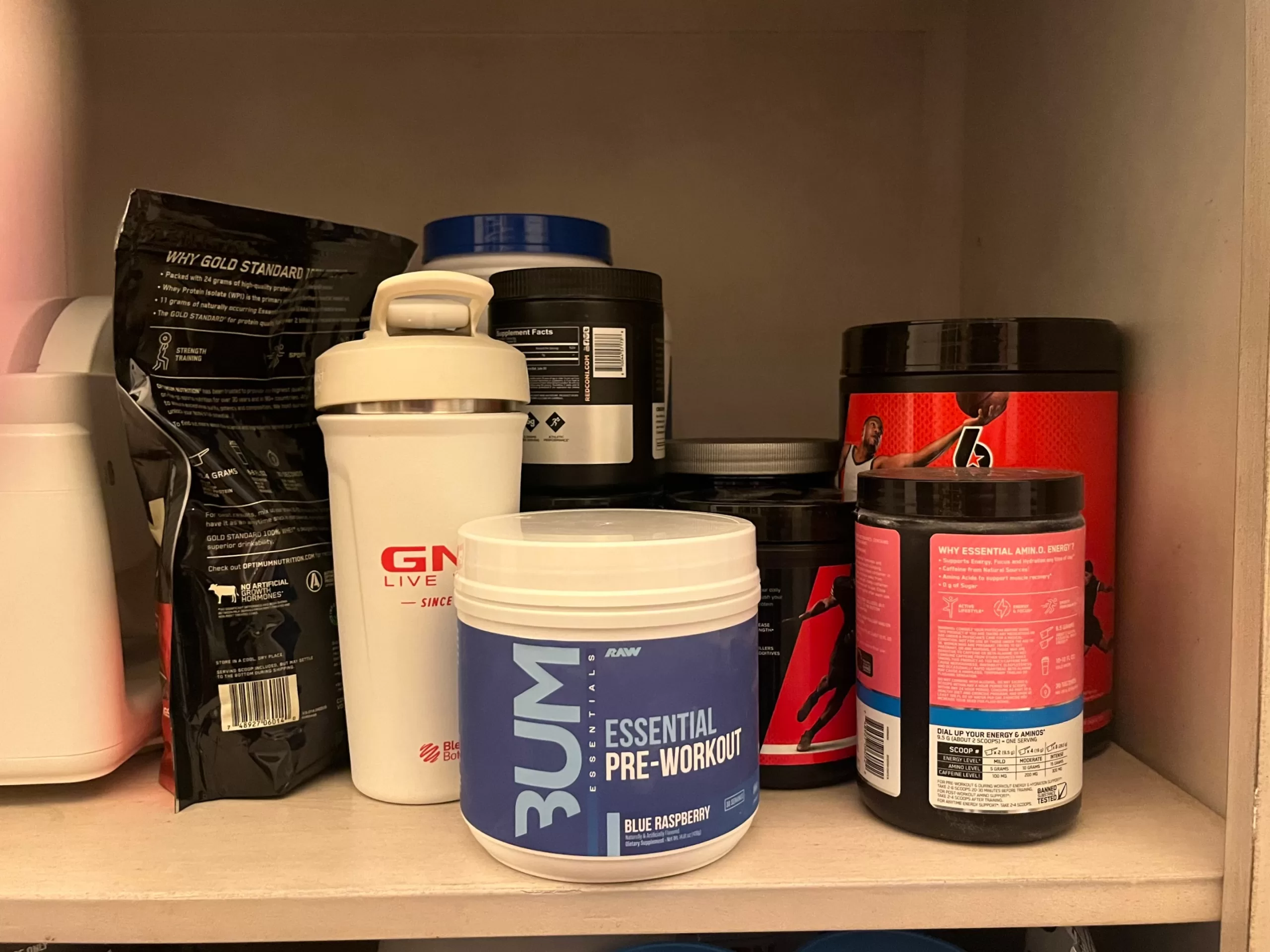
There are plenty of random ingredients that are included in pre workout supplements that are unnecessary. Some contain harmful or unnecessary additives include:
- Proprietary blends: Lack transparency about ingredient dosages.
- Artificial sweeteners and flavors: May cause stomach discomfort in some people.
- Banned stimulants: Ingredients like DMAA can have dangerous safety implications.
How to Choose a High-Quality Pre-Workout
- Look for third-party testing (e.g., NSF Certified for Sport).
- Check for clearly labeled dosages of active ingredients.
- Avoid products with artificial sweeteners or proprietary blends.
Is Pre-Workout Right for You?
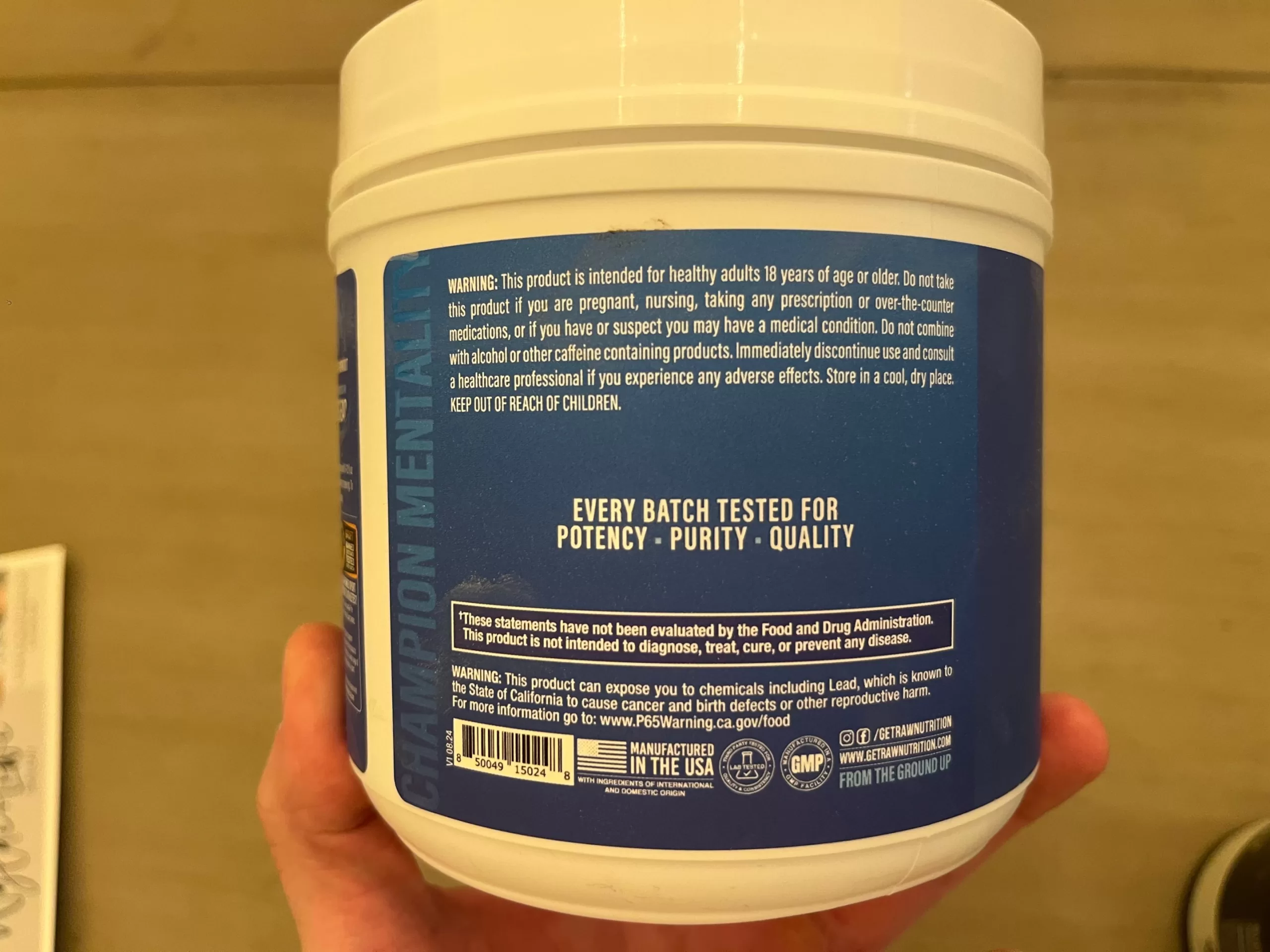
Pre-workout supplements are not a one-size-fits-all solution.
Consider your fitness goals, tolerance to stimulants, and overall health. If you aren’t sure if pre workout is a good idea for you, consult with a doctor or dietitian.
Based on goals:
- For Muscle Growth: Look for creatine, citrulline, and BCAAs.
- For Endurance: Beta-alanine, caffeine, and electrolytes are key.
- For Focus: Tyrosine and nootropics can help you stay sharp.
FAQs About Pre-Workouts

Can I take pre-workout every day?
It depends on tolerance and ingredient safety.
Does pre-workout help with muscle building?
Yes, with the right ingredients like creatine and BCAAs.
Does pre-workout expire?
Yes, pre workout can go bad. Read our article on the shelf life of pre workout for more details.
References
- Graham TE. Caffeine and exercise: metabolism, endurance and performance. Sports Med. 2001;31(11):785-807. doi: 10.2165/00007256-200131110-00002. PMID: 11583104.
- Guest NS, VanDusseldorp TA, Nelson MT, Grgic J, Schoenfeld BJ, Jenkins NDM, Arent SM, Antonio J, Stout JR, Trexler ET, Smith-Ryan AE, Goldstein ER, Kalman DS, Campbell BI. International society of sports nutrition position stand: caffeine and exercise performance. J Int Soc Sports Nutr. 2021 Jan 2;18(1):1. doi: 10.1186/s12970-020-00383-4. PMID: 33388079; PMCID: PMC7777221.
- Martinez N, Campbell B, Franek M, Buchanan L, Colquhoun R. The effect of acute pre-workout supplementation on power and strength performance. J Int Soc Sports Nutr. 2016 Jul 16;13:29. doi: 10.1186/s12970-016-0138-7. PMID: 27429596; PMCID: PMC4947244
- Yilmaz U, Buzdagli Y, Polat ML, Bakir Y, Ozhanci B, Alkazan S, Ucar H. Effect of single or combined caffeine and L-Theanine supplementation on shooting and cognitive performance in elite curling athletes: a double-blind, placebo-controlled study. J Int Soc Sports Nutr. 2023 Dec;20(1):2267536. doi: 10.1080/15502783.2023.2267536. Epub 2023 Oct 10. PMID: 37815006; PMCID: PMC10566444.
- Owen GN, Parnell H, De Bruin EA, Rycroft JA. The combined effects of L-theanine and caffeine on cognitive performance and mood. Nutr Neurosci. 2008 Aug;11(4):193-8. doi: 10.1179/147683008X301513. PMID: 18681988.
- Hobson RM, Saunders B, Ball G, Harris RC, Sale C. Effects of β-alanine supplementation on exercise performance: a meta-analysis. Amino Acids. 2012 Jul;43(1):25-37. doi: 10.1007/s00726-011-1200-z. Epub 2012 Jan 24. PMID: 22270875; PMCID: PMC3374095.
- Trexler ET, Smith-Ryan AE, Stout JR, Hoffman JR, Wilborn CD, Sale C, Kreider RB, Jäger R, Earnest CP, Bannock L, Campbell B, Kalman D, Ziegenfuss TN, Antonio J. International society of sports nutrition position stand: Beta-Alanine. J Int Soc Sports Nutr. 2015 Jul 15;12:30. doi: 10.1186/s12970-015-0090-y. PMID: 26175657; PMCID: PMC4501114.
- Gough LA, Sparks SA, McNaughton LR, Higgins MF, Newbury JW, Trexler E, Faghy MA, Bridge CA. A critical review of citrulline malate supplementation and exercise performance. Eur J Appl Physiol. 2021 Dec;121(12):3283-3295. doi: 10.1007/s00421-021-04774-6. Epub 2021 Aug 21. PMID: 34417881; PMCID: PMC8571142.
- Cholewa JM, Wyszczelska-Rokiel M, Glowacki R, Jakubowski H, Matthews T, Wood R, Craig SA, Paolone V. Effects of betaine on body composition, performance, and homocysteine thiolactone. J Int Soc Sports Nutr. 2013 Aug 22;10(1):39. doi: 10.1186/1550-2783-10-39. PMID: 23967897; PMCID: PMC3844502.
- Trexler ET, Smith-Ryan AE. Creatine and Caffeine: Considerations for Concurrent Supplementation. International Journal of Sport Nutrition and Exercise Metabolism. 2015 Dec;25(6):607-23. doi: 10.1123/ijsnem.2014-0193. PMID: 26219105.
- Antonio J, Candow DG, Forbes SC, Gualano B, Jagim AR, Kreider RB, Rawson ES, Smith-Ryan AE, VanDusseldorp TA, Willoughby DS, Ziegenfuss TN. Common questions and misconceptions about creatine supplementation: What does the scientific evidence really show? Journal of the International Society of Sports Nutrition. 2021;18(1):13. doi: 10.1186/s12970-021-00401-3.
- Sutton EE, Coill MR, Deuster PA. Ingestion of tyrosine: effects on endurance, muscle strength, and anaerobic performance. Int J Sport Nutr Exerc Metab. 2005 Apr;15(2):173-85. doi: 10.1123/ijsnem.15.2.173. PMID: 16089275.
- Bellar D, LeBlanc NR, Campbell B. The effect of 6 days of alpha glycerylphosphorylcholine on isometric strength. J Int Soc Sports Nutr. 2015 Nov 17;12:42. doi: 10.1186/s12970-015-0103-x. PMID: 26582972; PMCID: PMC4650143.
- Martinho DV, Nobari H, Faria A, Field A, Duarte D, Sarmento H. Oral Branched-Chain Amino Acids Supplementation in Athletes: A Systematic Review. Nutrients. 2022 Sep 27;14(19):4002. doi: 10.3390/nu14194002. PMID: 36235655; PMCID: PMC9571679.
- McLeay Y, Stannard S, Barnes M. The Effect of Taurine on the Recovery from Eccentric Exercise-Induced Muscle Damage in Males. Antioxidants (Basel). 2017 Oct 17;6(4):79. doi: 10.3390/antiox6040079. PMID: 29039798; PMCID: PMC5745489.
- Shirreffs SM, Sawka MN. Fluid and electrolyte needs for training, competition, and recovery. J Sports Sci. 2011;29 Suppl 1:S39-46. doi: 10.1080/02640414.2011.614269. PMID: 22150427.
- Lee MC, Hsu YJ, Shen SY, Ho CS, Huang CC. A functional evaluation of anti-fatigue and exercise performance improvement following vitamin B complex supplementation in healthy humans, a randomized double-blind trial. Int J Med Sci. 2023 Aug 15;20(10):1272-1281. doi: 10.7150/ijms.86738. PMID: 37786445; PMCID: PMC10542023.
- Gonzalez AM, Townsend JR, Pinzone AG, Hoffman JR. Supplementation with Nitric Oxide Precursors for Strength Performance: A Review of the Current Literature. Nutrients. 2023 Jan 28;15(3):660. doi: 10.3390/nu15030660. PMID: 36771366; PMCID: PMC9921013.
